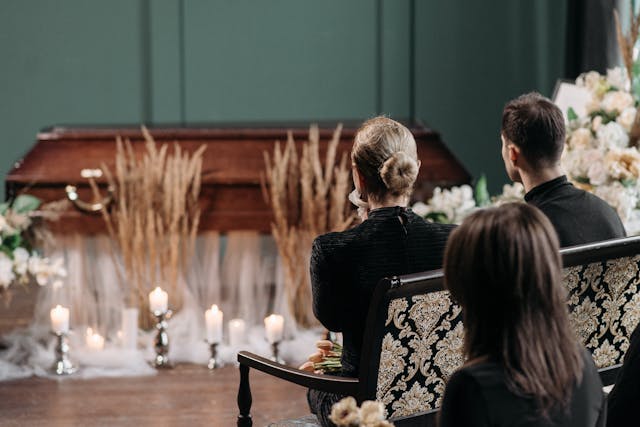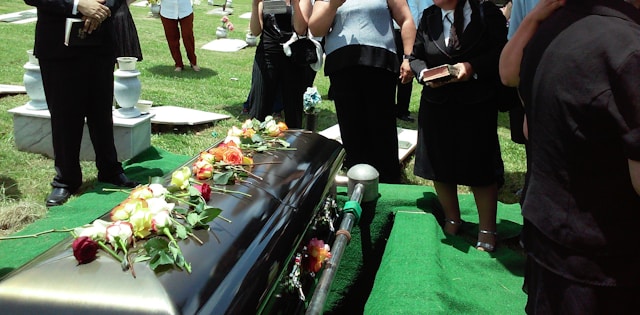Organising a funeral can be an emotionally overwhelming task, especially during a period of grief. The loss of a loved one is a deeply personal experience, and the responsibilities that follow can often add to the stress. Understanding the essential steps and considerations can aid the bereaved in navigating this challenging time with a clearer mind. Approaching the logistics methodically, while allowing oneself to process emotions, is crucial in this process.

Understanding the Responsibilities
The first step in planning a funeral involves understanding the various responsibilities that come with it. Traditionally, the family of the deceased holds the primary responsibility for making arrangements. This includes choosing a funeral home, selecting burial or cremation services, and determining the type of service or memorial planned. Having a checklist can help ensure that all necessary tasks are completed, from purchasing a casket or urn to selecting music or speakers for the ceremony.
In some cases, pre-planned funeral arrangements may exist, allowing loved ones to follow the deceased’s wishes closely. If you take a look at Boza & Roel Funeral Home, you can find professionals who can assist with the myriad of choices and help ensure that the process flows smoothly. If you’re uncertain about what to do next, consulting a professional can assist in navigating through the myriad of choices.
Choosing the Right Funeral Home
The selection of a funeral home is one of the most significant decisions that grieving families must make. When selecting a funeral home, consider its reputation, the services offered, and the costs involved. Recommendations from friends or family who have used specific funeral homes can be invaluable. If you’re seeking a compassionate environment, it may be worthwhile to visit a few options to determine where you feel most comfortable. Ensure the staff is empathetic and willing to guide you through the process.
Investigating the types of services offered by each funeral home can play a significant role in your decision. Some facilities might provide specialized services, such as customized memorial services, while others may focus more on traditional ceremonies. It can be helpful to compare multiple options and request estimates to ensure alignment with your budget.
Planning the Ceremony
After choosing a funeral home, the next step is planning the ceremony. The type of service often reflects the personality of the deceased, and it can range from a simple gathering to an elaborate celebration of life. Families can consider whether they wish to incorporate religious rituals, personal anecdotes, music, or visuals that honor the individual. Choosing participants, including family members or close friends to speak or perform, can create a more personal atmosphere.
Involving close family members in planning can help ensure that the service meets the family’s collective wishes, while providing an opportunity for shared grief. The act of planning can serve as a crucial step in the healing process, allowing families to honor the legacy of their loved ones fully.
Budgeting for Funeral Costs
Funeral costs can be overwhelming, especially at a time when financial concerns may be the last thing on one’s mind. Establishing a budget can help avoid additional stress. Many families find it helpful to outline potential expenses such as the cost of services, caskets, urns, or memorial prints before making final decisions. Having discussions with your chosen funeral home about pricing details can shed light on available options that align with your financial situation.
Inquiring about any available funeral assistance can ease this burden. Organizations, charities, or even specific government programs may provide financial support during such critical times. Understanding all available resources allows families to focus more on honoring their loved ones than worrying about financial implications.
Handling Logistics and Legal Formalities
When organising a funeral, there are several logistical and legal matters to address. These typically involve securing death certificates, managing notifications to relevant authorities, and making necessary arrangements with the cemetery or cremation service. It’s essential to consider that some legalities can take time, so addressing them sooner rather than later can prevent unnecessary delays in the funeral preparation. In many instances, the funeral home can assist with obtaining the necessary documentation, streamlining the process significantly.
It’s advisable to check whether the deceased had any pre-existing arrangements that may simplify this process. Familiarizing yourself with the relevant local laws and requirements about burial, cremation, and funeral services can save you from potential complications down the line.
Emotional Care and Support
Emotional health cannot be overlooked. Grief can manifest in various ways and can be intensified by the pressures of the organization. Giving oneself permission to grieve and lean on supportive friends and family is paramount. In some cases, professional support groups or counselors may provide additional avenues for dealing with grief. Ensuring that everyone involved has a chance to express their feelings can foster emotional healing, helping to create a more supportive family environment.
Acknowledging that the grieving process varies for everyone is essential. Taking time to reflect or seeking respite from planning can help rejuvenate an individual’s mental space, allowing them to tackle the next steps ahead.

Ultimately, planning a funeral is a complex process intertwined with emotions and logistics. While the journey ahead can seem daunting, approaching it with careful thought and support will contribute significantly to honoring a loved one’s memory.





